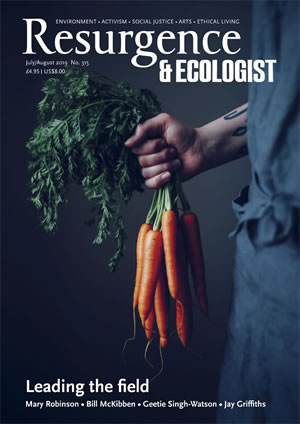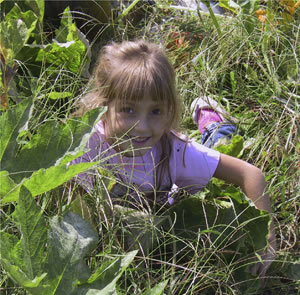All conversations that seek to find solutions to our environmental problems lead back to our behaviour as human beings, to what we do every day – how we live, how we eat, how we move around, how we consume, how we stay warm and how we develop our cities. I think the key to an ecologically sane future lies in what and how children and young people learn: what they learn from the examples around them, you and me, their mentors and role models, and how they learn about our world.
Part of my professional background has been in the addiction-recovery field. I see and study parallels between the difficulties addicted people have in bringing about their own recovery from the substances or behaviour on which they are so dependent. They are resistant to change. In similar ways, because of how we have been educated, we are resistant to changing our lifestyles as a healthy response to the challenges we face. Look how difficult it is even for dedicated environmentalists to walk the walk and, for instance, support veganism by stopping eating animal products, or cease flying unnecessarily around the planet. Old habits die hard; social conditioning dies harder.
It does not have to be that way, though. Many of the seeds of behaviour resistance (behaviour that is resistant to change even in the face of knowledge that tells us that change is the best and most logical course of action) are planted in childhood and when we were young people looking to find a path to adulthood.
The elephant in the room of the educational establishment is that, despite knowing that what we do every day is killing off the environment in which we can live healthily (which is a crisis in slow motion), our education system essentially still supports the status quo of the past, the same past that brought us here. Education systems are products of the development of wealth. The wealth we have benefited from over the last two centuries was built on the unsustainable exploitation of natural resources and human capital. The education systems that grew out of it were and to a large part still are aligned with that approach. Over the last several decades the education system has been tied to the massive momentum of the consumer society, to its supporting social contexts, and, I am sorry to say, to the sheer greed of many so-called intellectuals, shareholders and corporations. It is unlikely that education systems will influence children and young people to make the kind of world we now see we need, unless the system roots itself in a different paradigm and aligns with different interests that are focused on solving tomorrow’s problems.
A question we need to ask is, do education and the way it is delivered make it easier to change our behaviour when necessary, or do they make it harder?
The education systems of the world cannot stand apart from what we are all facing. We have to take responsibility for being part of the problem.
We are faced with a crisis in how we teach and how we expect young people to learn. It is also a problem of parenting. Parents need to ask themselves how much they actually understand about the educational choices they are making for their children – choices that are in the interest of us all.
Much of the educational establishment, astonishingly, behaves as if the world in 20 years’ time will be much the same as it was 10 years ago. Basing decisions on this is a massive disservice to all the five-year-olds being hustled through kindergarten to primary school and beyond. Many of these children, robbed, in essence, of childhood, face unbelievable competitive pressure resulting too often in mental health problems such as depression and anxiety. To add insult to that injury, they are being taught curriculums that are fast becoming obsolete for careers that are changing fast or disappearing under the onslaught of automation and austerity.
If we wish the future to be different, hopefully in ways that ensure that we all survive and thrive, then we need to start rescuing our children from the worst aspects of the education system, pushing back against the move toward reactionary solutions to the threats they face.
We need to go radically forward, not backward. We need to be brave enough to challenge conventional measures of educational attainment, such as statistics, SATS and the worshipping of testing and examination.
We need to become interested in how we can develop in children free minds that are not enslaved to consumerism in its current form, minds that have a healthy connection with our natural world, are not afraid to change, and are excited about their prospects, not riddled with anxiety. Most importantly, we need to develop young leaders not afraid to take on parts of the economic class that are blocking enlightened ecological change.
So, if there is any area where we can put our efforts that is most likely to bring about future change for the better it is in freeing children and young people from the tyranny of an education system designed in the early years of the industrial revolution that led us into the current environmental crisis.
We need to foster and nurture what has been lost to so many of us: what I call the green mind. A mind embracing the delights and benefits of the technological revolution but with connection to the Earth through bare feet planted firmly in the green grass flowing from the soil.
This is urgent, for the rate of change is fast, faster than I could have ever imagined 25 years ago.
We have run out of time to resist change. Future children will not forgive teachers and adults who do resist and will ultimately sweep us aside.
As teachers, educators and parents, we can start moving towards this liberation of children’s minds and hearts if we are guided by the following five ideas:
First, let’s focus on respect and emotional intelligence as opposed to rampant fear-based competition and coercion characterised by approval as an administered drug, and disapproval as the sanction for failure to scramble to the top.
Second, collaboration is our species’ number one successful evolutionary strategy. Let’s focus on building collaboration at all levels and at all ages with children and young people. Grant them equal voices in the development of learning.
Third, let’s encourage and protect play in the natural systems of the world. There can be no deep understanding of our Earth if we are deeply unfamiliar with it: if our home is a stranger to us. Children need to feel the grass between their toes, the wind and rain on their faces, smell the fragrances of flowers and hear the song of birds, the buzz and clatter of insects. Most of all they need to play in the natural world.
Fourth, let’s hand back as far as possible control over the process of learning. Teach what is necessary for safety and practicality. Other than that, let children and young people learn what they want to learn, when and how they want to learn it, with whom they want. Let them be primarily self-directed, able to activate and follow their interests and passions.
Last, but not least, teaching needs to transform into being facilitation (the word ‘facilitate’ means to ease and make easier) along with the development of self-direction I have already mentioned.
If we bring these five ideas into action, we can do much to make our jobs as teachers, parents, mentors and elders come alive in new ways. Children of today and tomorrow will see in us adult allies for the challenges they will have to face in the world, rather than the generations who sat around and did little while the problems grew. We can have a true partnership for a sane, greener future on our planet.








